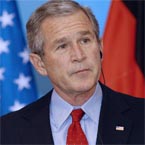Bush leaves office with failures, but a few successes
 Washington - US President George W Bush will leave office next month with some of the lowest job approval ratings ever, with two unresolved conflicts in Iraq and Afghanistan, and with Osama bin Laden still on the loose.
Washington - US President George W Bush will leave office next month with some of the lowest job approval ratings ever, with two unresolved conflicts in Iraq and Afghanistan, and with Osama bin Laden still on the loose.
He'll be leaving behind an economic recession and the US standing in the world at an all time low. President-elect Barack Obama will take his place facing a long list of challenges at home and abroad.
Bush has become an easy target for critics, mostly because of the invasion of Iraq in 2003 that was based on incorrect intelligence that Saddam Hussein had weapons of mass destruction, and the subsequent bungling of the war effort that left Iraq in a state of violent chaos until until some improvements over the past year.
But despite all of the criticism and problems left in his wake, Bush has had some shining foreign policy successes that have been overshadowed by the mistakes.
Under Bush, the United States ended decades of frosty Cold War relations with India earlier this year, cementing ties by signing a landmark accord that allows US firms to sell civilian nuclear technology to India.
"The Bush administration's most unheralded foreign policy success ... is the dramatic upswing in US-Indian relations," said Peter Brookes of the conservative Heritage Foundation think tank in Washington.
The nuclear deal was the final pin in the relationship between the two counties who have now established solid business and diplomatic ties and become partners in the war on terrorism.
But perhaps the most important strategic aspect of the new relationship is having an emerging and powerful friend in South Asia to counter China's vast regional influence.
"India and the US are natural, even well-suited, allies in managing and tempering China's ascendance," Brookes said.
Republican Senator Richard Lugar, a foreign policy expert with a pragmatic approach, called the nuclear accord "one of the most important strategic diplomatic initiatives undertaken in the last decade."
Critics charge the deal increases the risks of nuclear proliferation because India has not signed international treaties governing the use of nuclear material.
Another achievement that has gone even more unnoticed in most of the world is the unprecedented amount of money Bush has poured into fighting AIDS and malaria in Africa.
Bush launched the President's Emergency Plan for AIDS Relief in 2003, a five-year programme for AIDS prevention and treatment in Africa that has already spent 18.8 billion dollars on fighting the disease.
Known as "Pepfar," the programme has gotten anti-retroviral drugs into the hand of 1.3 million people across the continent, and includes education programmes. It has however, been criticized for focusing on abstinence as the key to preventing the disease.
Bush was greeted by cheering crowds during trips Benin, Liberia, Ghana, Rwanda and Tanzania in February. While in Tanzania, Bush called on US lawmakers to double the size of Pepfar for the next five years, and Congress has authorized another 48 billion for the programme. Sub-Sahara Africa is probably the only place on the planet where Bush is popular.
"I am a very severe critic of the Bush administration," Joel Barkan, an analyst at the Washington-based Centre for Strategic and International Studies, told The Independent.
"But you cannot take away from the president the fact that the commitment of the US, in terms of aid and debt relief, is certainly greater under Bush" than former president Bill Clinton. The Clinton administration in its last year spent 1.4 billion in total aid for Africa.
After decades of hostility, the Bush administration, working with the British, convinced Libyan leader Moamer Gaddafi to give up his weapons of mass destruction programmes, ushering in new relations.
Bush administration officials believe the quick toppling of Saddam's regime persuaded Gaddafi to plot a different course. The two sides also came to a settlement of the
1988 bombing of a Pan Am flight over Lockerbie, Scotland.
The United States and Libya restored full diplomatic relations in 2006 and in September, US Secretary of State Condoleezza Rice landed in Libya, becoming the first top US diplomat to visit the country since 1953. (dpa)